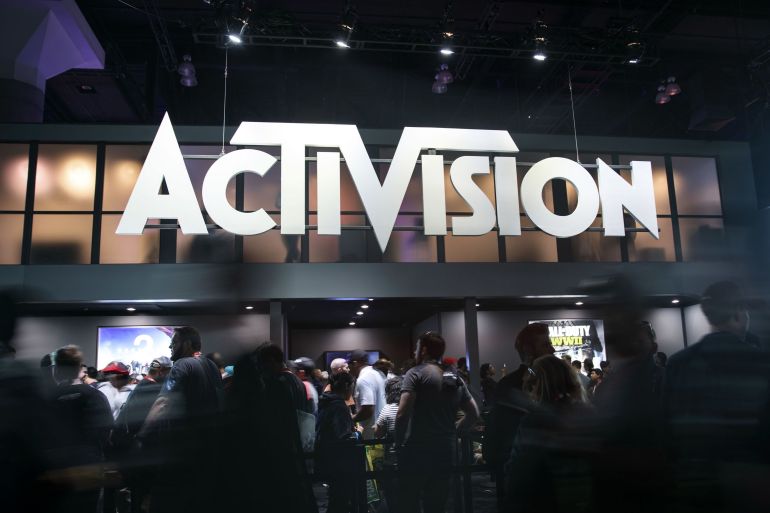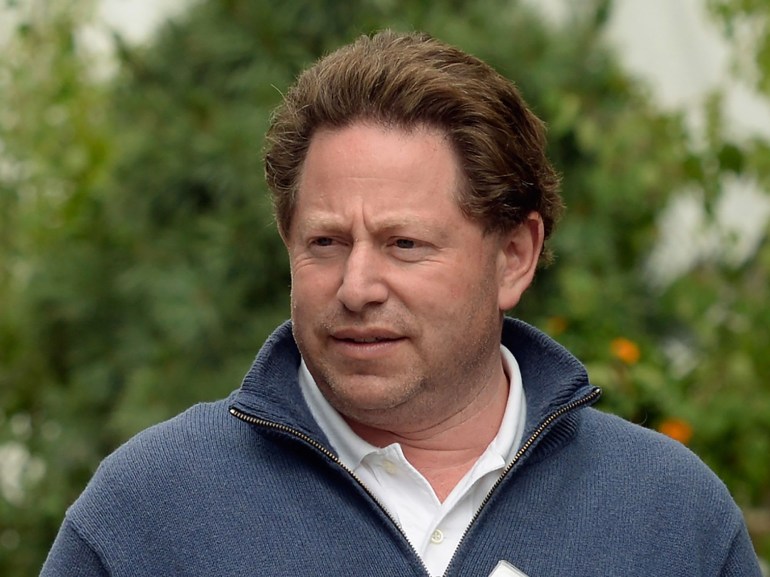Microsoft to buy Activision Blizzard in $69BN metaverse bet
Founded in 1979, Activision is home to some of the most popular game franchises in the world, including Call of Duty, World of Warcraft, Candy Crush and Guitar Hero.

Microsoft Corp. agreed to buy Activision Blizzard Inc. in a $68.7 billion deal, uniting two of the biggest forces in video games to create the world’s third-biggest gaming company.
In its largest purchase ever, Microsoft will pay $95 a share in cash for one of the most legendary gaming publishers, known for titles like Call of Duty and World of Warcraft but which is also grappling with a cultural upheaval over its treatment of women.
Keep reading
list of 4 itemsMicrosoft and Alphabet see worst week since start of pandemic
Microsoft becomes world’s most valuable stock as Apple dips
Russian agency behind Solarwinds still targeting US: Microsoft
Activision Chief Executive Officer Bobby Kotick will continue to serve in that role only until the deal closes, a person familiar with the deal said. It’s unclear what position, if any, he would take afterward. Once the transaction is completed, the Activision Blizzard business will report to Phil Spencer, who was promoted along with the deal to CEO of Microsoft Gaming.
Adding Activision’s stable of popular titles will help Microsoft expand its own offerings for the Xbox console and push it into the fast-growing markets for mobile gaming and the metaverse. It also fits with Chief Executive Officer Satya Nadella’s strategy of focusing on content, community and cloud software.
Activision, which has a long history with Microsoft’s Xbox, will also help the software giant better compete with rival Sony Corp.’s PlayStation. The publisher’s largest franchise, Call of Duty, became successful largely due to Microsoft’s online platform Xbox Live, which allows gamers to connect for multiplayer matches. Most of Activision’s games are designed to run on Xbox consoles.
“Gaming has been key to Microsoft since our earliest days as a company,” Nadella said in a note to employees. “Today, it’s the largest and fastest-growing form of entertainment, and as the digital and physical worlds come together, it will play a critical role in the development of metaverse platforms.”
Microsoft’s shares were little changed on the news. The bid is a 45% premium on Activision’s closing price Friday. However, it’s a bargain compared with the stock’s performance in the first half of last year, before a sexual bias lawsuit filed by a California state agency in July plunged the company into crisis. The shares hit a high of more than $100 apiece in February and then lost nearly half their value by the end of the year.
The scandal has taken a toll on a company already struggling to adapt to the end of a pandemic-fueled video game boom. In November, Activision delayed two of its most anticipated games and gave a sales forecast for the fourth quarter that fell short of Wall Street’s expectations.

Kotick, who has led the company for three decades, has come under pressure from employees to resign in the wake of the ongoing lawsuits and allegations reported in the Wall Street Journal that tie him to reports of mistreatment of women and suggest that he was aware for years of sexual misconduct, including rape, at the company but didn’t report it to the board. Kotick has apologized and pledged to make changes.
Spencer said last November that Microsoft was reevaluating its relationship with Activision and making “proactive adjustments” in the wake of the Wall Street Journal report.
“We also recognize that after the close, we will have significant work to do in order to continue to build a culture where everyone can do their best work,” Nadella said on a call with investors.
Founded in 1979, Activision is home to some of the most popular game franchises in the world, including Candy Crush, Guitar Hero, Skylanders, Destiny, Crash Bandicoot and the Tony Hawk skateboarding titles. Its Call of Duty franchise is particularly notable for its lasting appeal, opening week sales and, increasingly, its reach in Asia. The mobile edition of the game launched in China in December 2020, quickly hitting the top of the download charts. It brought in tens of millions of new fans, “with player investment in the first quarter on par with the rest of the world combined,” the company said in May.
The franchise is arguably Activision Blizzard’s most important business. In 2020, the company’s Activision segment — nearly all of which is Call of Duty — accounted for 55% of the company’s operating profit.
But some of Activision’s games aren’t capturing the zeitgeist the way they once did. In 2021, Baird analysts published a report that revealed searches for Call of Duty and World of Warcraft were down markedly from the prior year, falling 32% and 44%, respectively.
“Acquiring Activision will help jump-start Microsoft’s broader gaming endeavors and ultimately its move into the metaverse with gaming the first monetization piece of the metaverse,” Dan Ives, an analyst at Wedbush Securities, wrote in a note to investors. “With Activision’s stock under heavy pressure (CEO related issues/overhang) over the last few months, Microsoft viewed this as the window of opportunity to acquire a unique asset that can propel its consumer strategy forward.”
Microsoft plans to keep making some of Activision’s games for PlayStation consoles but will also keep some content exclusive to Xbox, said a person familiar with the company’s thinking.
“I’ll just say to players out there who are playing Activision Blizzard games on Sony’s platform: It’s not our intent to pull communities away from that platform and we remained committed to that,” Spencer said in an interview.
Microsoft has made several acquisitions recently to bolster its roster of games studios. In 2020, it agreed to acquire ZeniMax Media Inc., home to The Elder Scrolls and Doom publisher Bethesda Softworks, for $7.5 billion. At the time, this was Microsoft’s biggest video game purchase ever. Microsoft also spent $2.5 billion in 2014 to to purchase Mojang, the maker of Minecraft, a popular virtual-world-building game that is seen as a path to the company’s future metaverse ambitions. Microsoft said the Activision deal will vault it to No. 3 in the gaming industry, behind China’s Tencent Holdings Ltd. and Japan’s Sony.
Driving Microsoft’s ambition is its Game Pass subscription service, which gives members access to all of its first-party games — those from the studios it owns — for no extra charge, and on the day of their commercial release. Recently, it’s added titles from other publishers, such as Electronic Arts Inc., but owning the underlying developers gives Microsoft the freedom to keep the most popular titles from competing platforms, such as the PlayStation.
Microsoft is also banking on the rise in mobile gaming, the fastest-growing part of the industry and one of the software giant’s weak spots. Earlier this month, Take-Two Interactive Software Inc. agreed to buy mobile game maker Zynga Inc. in a deal valued at $11 billion to help the publisher of Grand Theft Auto break into the market for smartphone games.
Microsoft said it’s deal for Activision will allow gamers to enjoy hit titles like Halo and Warcraft “virtually anywhere they want.” Activision’s mobile business represents a “significant presence and opportunity” for Microsoft, the company said.
Goldman Sachs Group Inc. and Simpson Thacher & Bartlett LLP advised Microsoft while Allen & Company LLC and Skadden, Arps, Slate, Meagher & Flom LLP worked with Activision.